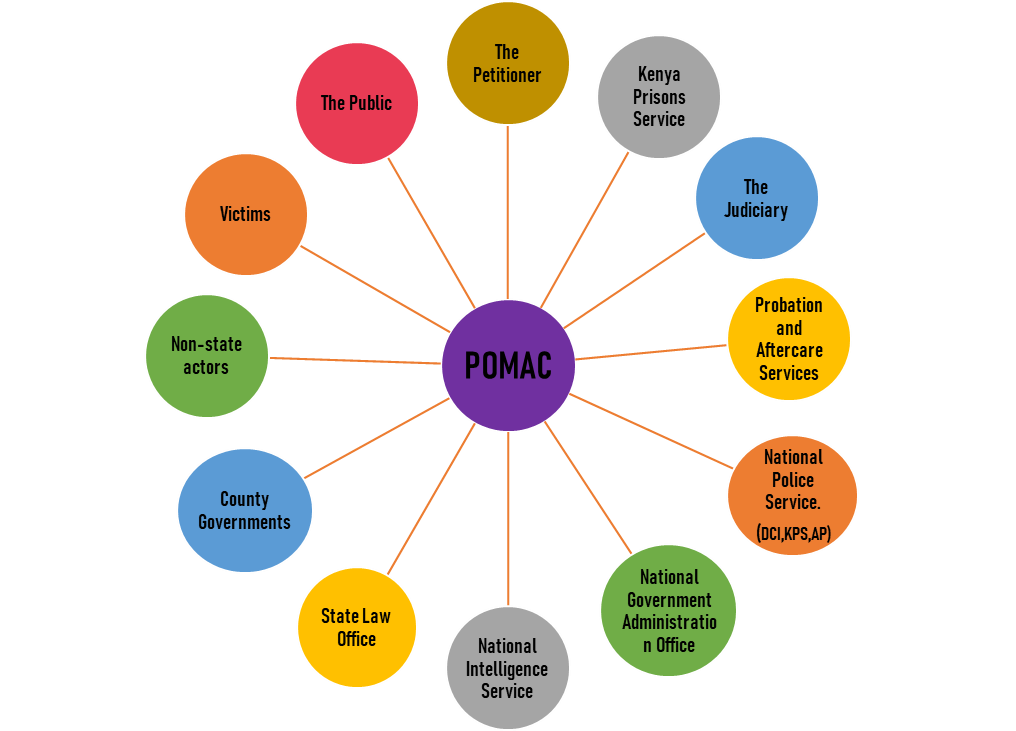Our Key Stakeholders
The Power of Mercy Advisory Committee actively collaborates with key stakeholders to enhance knowledge sharing and to improve service delivery.
Some of the key stakeholders who work closely with the Committee include: Kenya Prisons Service, Judiciary, Probation and Aftercare Services, National Government Administration Office (NGAO), National Intelligence Service, State Law Office, County Governments, Non-State Actors, and Media among others.
- According to the Constitution and the Power of Mercy Act any person can petition for mercy except those serving suspended sentences, on probation or having pending judicial remedy. The Petition may be done by the petitioner or their representative by filing a prescribed form.
- Custodian of POMAC’s clients
- Pardon officers are also prison officers
- Pardon officers report to the Committee through the Officer in Charge
- Assists inmates in the preparation of Petitions for power of mercy
- Ensures accurate compilation of prison reports which are filed with POMAC
- Makes necessary preparations for POMAC’s interviews within the institutions.
- Through the Pardon officers, the Service ensures that Petition registers are well maintained
- Provides court records that are vital in the process of consideration for pardon. Such record includes court proceedings, judgment and notice of appeal where applicable.
- Provides reports on the petitioners who have petitioned for clemency.
- Facilitates reintegration and resettlement of pardoned offenders in the community.
- Provide aftercare service for offenders who have been granted mercy
- Prepares periodic reports on the progress of pardoned offenders.
- The DCI vets offenders who are being considered for pardon by reviewing and submitting to the Committee criminal records of each of the petitioners considered for clemency.
- Provision of key information to POMAC mainly through the local administrators.
- Through public barazas undertake community sensitization, education and community acceptance of offenders who have been granted pardon.
- Assists and ensures smooth re-integration, family re-unification and social re-adjustment of pardoned offenders.
- Monitors the resettlement of pardoned offenders in their localities, provide periodic feedback and challenges with a view to guaranteeing public protection.
- The National Intelligence Service vets all petitioners being considered for mercy to protect the interests of the State.
- By virtue of Article 133(2) (a) of the Constitution, the Attorney-General is the chairperson of the Committee, and the Office of the Attorney general provides legal advice to the Committee.
- The Committee engages county governments to provide support for the resettlement and re-integration and resettlement of pardoned offenders.
-
The Committee similarly partners with non-state actors that have established linkages with correctional services in Kenya. These include among others; religious organizations, community-based organizations and non-government organizations. Such organizations work on various programs including offender rehabilitation, offender resettlement and re-integration, human rights, capacity building and training.
- Victims and their families are entitled to participate in the Petition Process and may submit an impact statement either orally or in writing. Victim impact statements may include information about the physical and emotional harm caused to them by the offence. The statements may also include any reconciliation efforts or any safety concerns that the victim may have in the case the offender is pardoned.
- The Committee engages the general public to provide information on the power of mercy and to support re-integration and resettlement of pardoned offenders released into the community
Ministry of Defence
- Kenya Defence Forces through the Ministry of Defense aids in processing of petitioners who were initially tried and convicted through the court martial.
Ministry of Health
- Through the Medical Superintendent at Mathari Referral hospital, the Ministry collaborates with the Probation Department in assisting mental offenders petition for mercy.
- Provides progress and psychiatric assessment reports for mentally ill offenders who are under consideration by the Committee.
- The Ministry further provides on-going care and treatment to pardoned offenders as may be required.
Ministry of Foreign Affairs
- Assist in mutual transfer of offenders.
Kenya Law Reform Commission (KLRC)
- The Committee partners with the Kenya Law Reform Commission to strengthen its legal framework.
Office of Director of Public Prosecutions (ODPP)
- POMAC has collaborated with the ODPP in creating synergies through stakeholders’ engagement forums.
Kenya National Commission on Human Rights (KNCHR)
- The KNCHR has a role of reviewing the Committee and stakeholder practices to ensure that the rights of petitioners are upheld and the practices are in compliance with human rights provisions.
- KNHCR is a member of the selection panel under the Power of Mercy Act.
The National Committee on Community Service Orders (NCCSO)
- POMAC has collaborated with the NCCSO in creating synergies through stakeholders’ engagement forums.
National Crime Research Centre (NCRC)
- The Committee partners with the National Crime Research Center to conduct relevant research.
National Council of Administration of Justice (NCAJ)
- The Committee works with the NCAJ to coordinate justice sector agencies and services involved in implementation of the power of mercy.
Media
- The Media acts as an important intermediary between the Committee and the public by way of disseminating information on the petition processes and work of the Committee.

